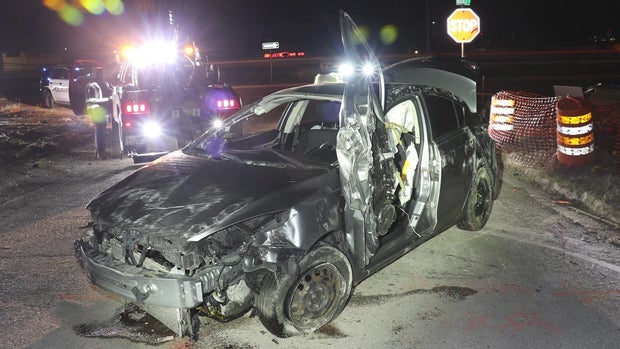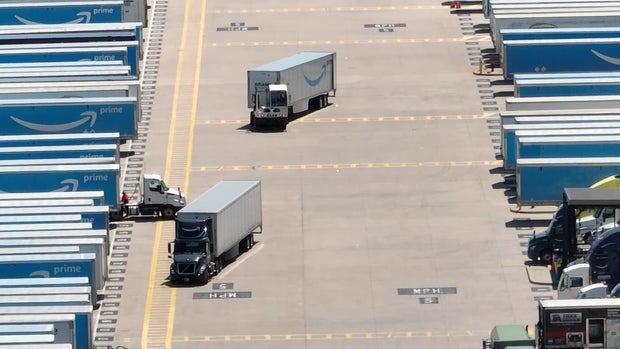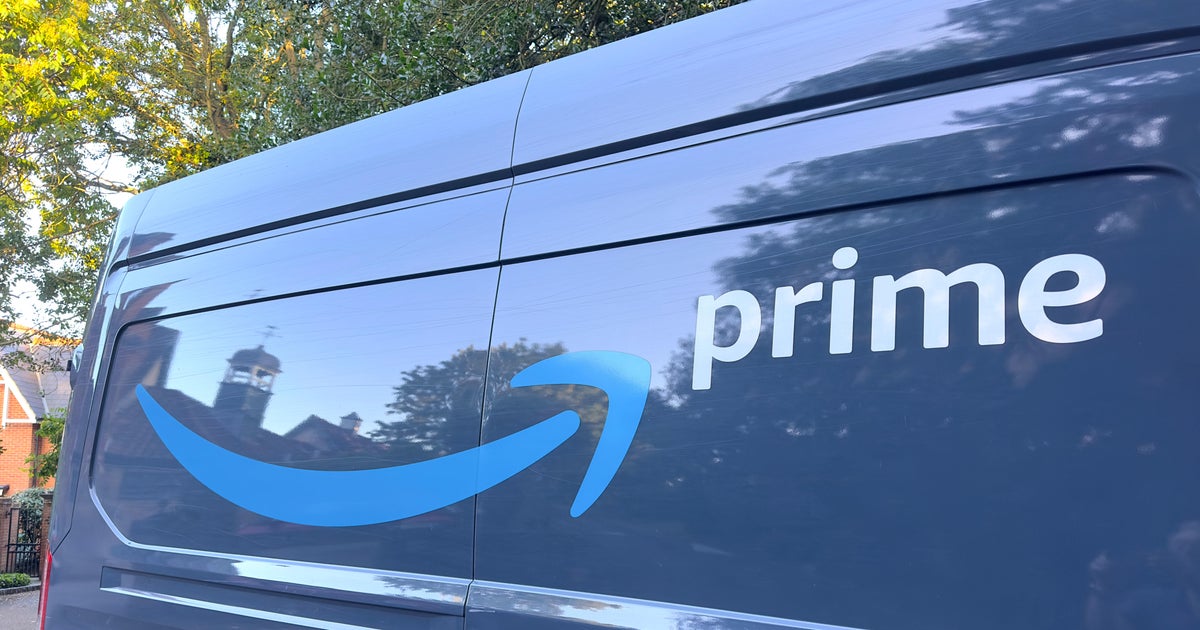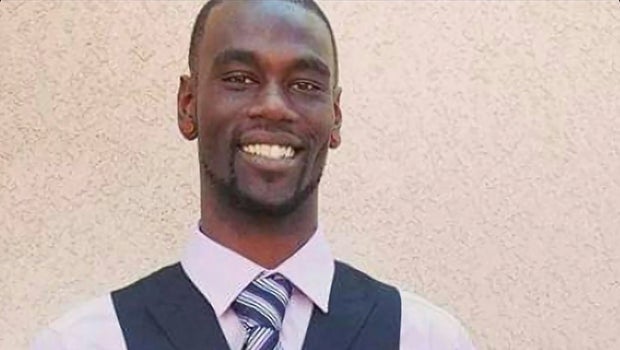CBS News
Amazon trucking contractors have higher rates of safety violations, CBS News investigation finds

The death of a 19-year-old college student on a Texas highway is raising questions about the fleet of drivers Amazon uses to move packages between its facilities. College freshman Iliana Velez’s life was cut short in a crash with a contractor who was driving to pick up an Amazon load.
A University of Texas freshman, Velez was working nights sorting packages part time at an Amazon fulfillment center.
In the early morning hours of Jan. 3, 2022, Velez was on a break when she was forced off the road by a box truck driven by Jordan Sannicola, a contractor on his way to pick up an Amazon shipment. Velez’s car rolled multiple times. She died at the scene.
CBS News
Her mother, Trula Velez, received the news from police that same evening.
“The officer knocked on my door and he said that she was involved in an accident, and she didn’t make it,” she said. “I was such in a state of shock.”
When Sannicola was arrested four weeks later, investigators learned he had a history of traffic violations, a suspended driver’s license and outstanding felony warrants, including one count of evading arrest with a vehicle. He told police he was using a hand-held mobile device when he collided with Iliana Velez’s car.
“Someone with multiple warrants should not have been hired,” Trula Velez said.
San Marcos Police Department
A lawsuit filed by Trula Velez alleges Amazon had previously rejected Sannicola’s application to deliver packages for the company’s “flex” home delivery service after he failed a background check. Still, he was able to drive for an Amazon-contracted company. Despite his criminal history and driving record, Take Flight with B, a North Carolina motor carrier company, hired Sannicola to move Amazon freight.
Missed warning signs?
The Velez family attorney, Alex Hilliard, claims that because of the background check, Amazon was “fully aware” of Sannicola’s poor driving record and criminal background when he started driving for Take Flight, which transported goods between Amazon facilities on a segment of the delivery network known as the “middle mile.”
The lawsuit also alleges tracking technology provided by the Relay phone application Amazon uses to monitor driver location and performance had informed the company of Sannicola’s unsafe driving behavior, but it failed to act.
“Mr. Sannicola had 70 different speeding violations [while working for Take Flight] that Amazon had been notified of,” said Hilliard. “They did nothing about that.”
A CBS News analysis of federal safety data revealed Amazon contractors primarily in the company’s “middle-mile” delivery network had monthly violation rates — such as speeding and texting while driving — that were usually double those of carriers who didn’t transport for Amazon. The analysis examined six years of monthly Federal Motor Carrier Safety Administration (FMCSA) unsafe driving rates and found the average rates of carriers who shipped for Amazon were at least 89% higher in every month.

“I was stunned,” said Jason Miller, a professor at Michigan State University who is an expert in supply chain management. “I’ve published many articles using these data. You do not see effects like this normally, where you have a set of carriers that is almost twice as unsafe as a different set of carriers.”
CBS News used roadside inspection reports in federal data to identify Amazon contractors. The reports, which are produced by law enforcement, indicate who a carrier said they were shipping for at the time of inspection. The analysis included carriers who shipped at least once for Amazon in the two years leading up to each month examined.
Miller said the large patchwork of contractors Amazon uses for “middle-mile” transport poses challenges to ensuring a uniform culture of safety.
“The more you are essentially having your freight hauled by hundreds, if not thousands of small young firms, that makes it much more difficult to ensure those firms are operating safely versus a more – what we call strategic procurement model, where you may have a few very large carriers that you work with that handle a lot of freight,” said Miller.
In the past two years, at least 57 people have died in more than four dozen crashes involving federally regulated carriers shipping for Amazon, according to FMCSA data, though the data does not indicate who was at fault in these incidents. The FMCSA produces a crash involvement score for carriers, but it is not public.
Amazon’s response
“Any fatality is heartbreaking,” said Tim Goodman, Amazon’s global legal director for road safety. “Any families that have been affected by this all have our condolences and our hearts go out to them.”
While Amazon mandates background checks for contracted drivers who deliver directly to customers’ homes, Goodman said the company looks to the FMCSA to oversee “middle-mile” contractors who move freight between facilities in larger vehicles.
A spokeswoman for FMCSA confirmed it requires contractors who dispatch commercial motor vehicles with a gross vehicle weight rating of more than 10,000 pounds to conduct background checks into drivers’ safety performance history as a condition of employment.
Amazon said when the company learns a contracted carrier has violated FMCSA guidelines, the carrier can face consequences, including permanent suspension.
“We have taken disciplinary action against around 19,000 motor carriers for failing to meet FMCSA safety requirements,” Goodman said.
Among those carriers is Take Flight with B, the contractor that hired Jordan Sannicola. Amazon confirmed it suspended Take Flight with B permanently from its contracted fleet. The motor carrier has since gone out of business.
Goodman defended Amazon’s continuing reliance on third-party trucking contractors to move its freight and deliver packages.
“In the United States, transportation with motor carriers is driven by independent businesses, small businesses,” said Goodman. “It has been that way since at least the Carter administration.”
“We are unique at Amazon in terms of our scale,” Goodman said. “But it’s a business model that has worked, and worked well, and we’re committed to having it be a catalyst to be able to improve safety for the roads for all of us.”
CBS News
Amazon disputes CBS News’ data findings. In a statement sent after the interview, a spokesperson said: “We’ve worked closely with CBS throughout this story, and are disappointed that they continue to use data based on a flawed methodology. We take safety incredibly seriously and the truth is that overall crash rates across third party carriers that we work with have improved. Our standards are stricter than FMCSA requirements, and we’ll continue working to ensure our partners are the safest carriers on the road.”
Among other complaints, the company took issue with how CBS News identified Amazon contractors—it said inspection reports sometimes list the wrong shipper—and how CBS News measured a carrier’s safety.
Amazon measures safety using the FMCSA’s “unsafe driving score,” which is a number that applies different standards depending on the size of the carrier. This score is not made public by the government, but the underlying data is. Rather than ranking the carriers by size, CBS News looked directly at the underlying rates of unsafe driving violations like texting and speeding.
CBS News consulted with multiple leading supply chain researchers, who all use FMCSA measures in peer-reviewed studies. Alex Scott, a University of Tennessee professor and expert in supply chain management, said he does not use the FMCSA’s scores in part because they make smaller carriers appear safer than they are.
“I don’t think that makes any sense,” Scott said. “If they’re less safe, then they’re less safe.”
What the court system says
On Oct. 11, a judge sentenced Jordan Sannicola to a 40-year prison term for the charge of “failing to stop and render aid — accident involving death” in the crash that killed Iliana Velez.
San Marcos Police Department
“One mistake cost someone’s life, and that was my daughter’s, and her life was just getting started,” Trula Valez said.
A court date for her lawsuit against Amazon is set for early 2025.
CBS News
12/4: The Daily Report – CBS News

Watch CBS News
Be the first to know
Get browser notifications for breaking news, live events, and exclusive reporting.
CBS News
2 students wounded in shooting at Northern California school

Watch CBS News
Be the first to know
Get browser notifications for breaking news, live events, and exclusive reporting.
CBS News
Memphis police discriminate against Black people and use excessive force, Justice Department report finds

The Memphis Police Department uses excessive force and discriminates against Black people, according to the findings of a U.S. Department of Justice investigation launched after the beating death of Tyre Nichols after a traffic stop in 2023.
A report released Wednesday marked the conclusion of the investigation that began six months after Nichols was kicked, punched and hit with a police baton as five officers tried to arrest him after he fled a traffic stop.
The report says that “Memphis police officers regularly violate the rights of the people they are sworn to serve.”
“The people of Memphis deserve a police department and city that protects their civil and constitutional rights, garners trust and keeps them safe,” Assistant Attorney General Kristen Clarke of the Justice Department’s Civil Rights Division said in an emailed statement.
Courtesy of the Nichols family via AP
The city said in a letter released earlier Wednesday that it would not agree to negotiate federal oversight of its police department until it could review and challenge results of the investigation.
City officials had no immediate comment on the report but said they plan to hold a news conference Thursday after Justice Department officials hold their own news conference in Memphis on Thursday morning to address the findings.
Police video showed officers pepper spraying Nichols and hitting him with a Taser before he ran away from a traffic stop. Five officers chased down Nichols and kicked, punched and hit him with a police baton just steps from his home as he called out for his mother. The video showed the officers milling about, talking and laughing as Nichols struggled with his injuries.
Nichols died on Jan. 10, 2023, three days after the beating. The five officers — Tadarrius Bean, Demetrius Haley, Emmitt Martin, Desmond Mills Jr. and Justin Smith — were fired, charged in state court with murder, and indicted by a federal grand jury on civil rights and witness tampering charges.
Nichols was Black, as are the former officers. His death led to national protests, raised the volume on calls for police reforms in the U.S., and directed intense scrutiny towards the police department in Memphis, a majority Black city.
The report specifically mentions the Nichols case, and it addresses the police department’s practice of using traffic stops to address violent crime. The police department has encouraged officers in specialized units, task forces, and on patrol to prioritize street enforcement, and officers and community members have described this approach as “saturation,” or flooding neighborhoods with traffic stops, the report said.
“This strategy involves frequent contact with the public and gives wide discretion to officers, which requires close supervision and clear rules to direct officers’ activity,” the report said. “But MPD does not ensure that officers conduct themselves in a lawful manner.”
The report said prosecutors and judges told federal investigators that officers do not understand the constitutional limits on their authority. Officers stop and detain people without adequate justification, and they conduct invasive searches of people and cars, the report said.
“Black people in Memphis disproportionately experience these violations,” the report said. “MPD has never assessed its practices for evidence of discrimination. We found that officers treat Black people more harshly than white people who engage in similar conduct.”
The investigation found that Memphis officers resort to force likely to cause pain or injury “almost immediately in response to low-level, nonviolent offenses, even when people are not aggressive.”
The report says officers pepper sprayed, kicked and fired a Taser at an unarmed man with a mental illness who tried to take a $2 soda from a gas station. By the end of an encounter outside the gas station, at least nine police cars and 12 officers had responded to the incident, for which the man served two days in jail for theft and disorderly conduct.
In a letter to the Justice Department’s Civil Rights Division released earlier Wednesday, Memphis City Attorney Tannera George Gibson said the city had received a request from the DOJ to enter into an agreement that would require it to “negotiate a consent decree aimed at institutional police and emergency services.”
A consent decree is an agreement requiring reforms that are overseen by an independent monitor and are approved by a federal judge. The federal oversight can continue for years, and violations could result in fines paid by the city.
It remains to be seen what will happen to attempts to reach such agreements between cities and the Justice Department once President-elect Donald Trump returns to office and installs new department leadership. The Justice Department under the first Trump administration curtailed the use of consent decrees, and the Republican president-elect is expected to again radically reshape the department’s priorities around civil rights.
“Until the City has had the opportunity to review, analyze, and challenge the specific allegations that support your forthcoming findings report, the City cannot — and will not — agree to work toward or enter into a consent decree that will likely be in place for years to come and will cost the residents of Memphis hundreds of millions of dollars,” the letter said.
The officers in the Nichols case were part of a crime suppression team called the Scorpion Unit, which was disbanded after Nichols’ death. The team targeted drugs, illegal guns and violent offenders, with the goal of amassing arrest numbers, while sometimes using force against unarmed people.
Memphis police never adopted policies and procedures to direct the unit, despite alarms that it was minimally supervised, according to the Justice Department report. Some prosecutors told department investigators that there were some “outrageous” inconsistences between body camera footage and arrest reports, and if the cases went to trial, they would be “laughed out of court.” The report found that the unit’s misconduct led to dozens of criminal cases being dismissed.
In court proceedings dealing with Nichols’ death, Martin and Mills pleaded guilty to the federal charges under deals with prosecutors. The other three officers were convicted in early October of witness tampering related to the cover-up of the beating. Bean and Smith were acquitted of civil rights charges of using excessive force and being indifferent to Nichols’ serious injuries.
Haley was acquitted of violating Nichols’ civil rights causing death, but he was convicted of two lesser charges of violating his civil rights causing bodily injury. The five men face sentencing by a federal judge in the coming months.
Martin and Mills also are expected to change their not guilty pleas in state court, according to lawyers involved in the case. Bean, Haley and Smith have also pleaded not guilty to state charges of second-degree murder. A trial in the state case has been set for April 28.
Justice Department investigators have targeted other cities with similar probes in recent years, including Minneapolis after the killing of George Floyd, and Louisville, Kentucky, following an investigation prompted by the fatal police shooting of Breonna Taylor.
In its letter, the city of Memphis said the DOJ’s investigation “only took 17 months to complete, compared to an average of 2-3 years in almost every other instance, implying a rush to judgment.”














